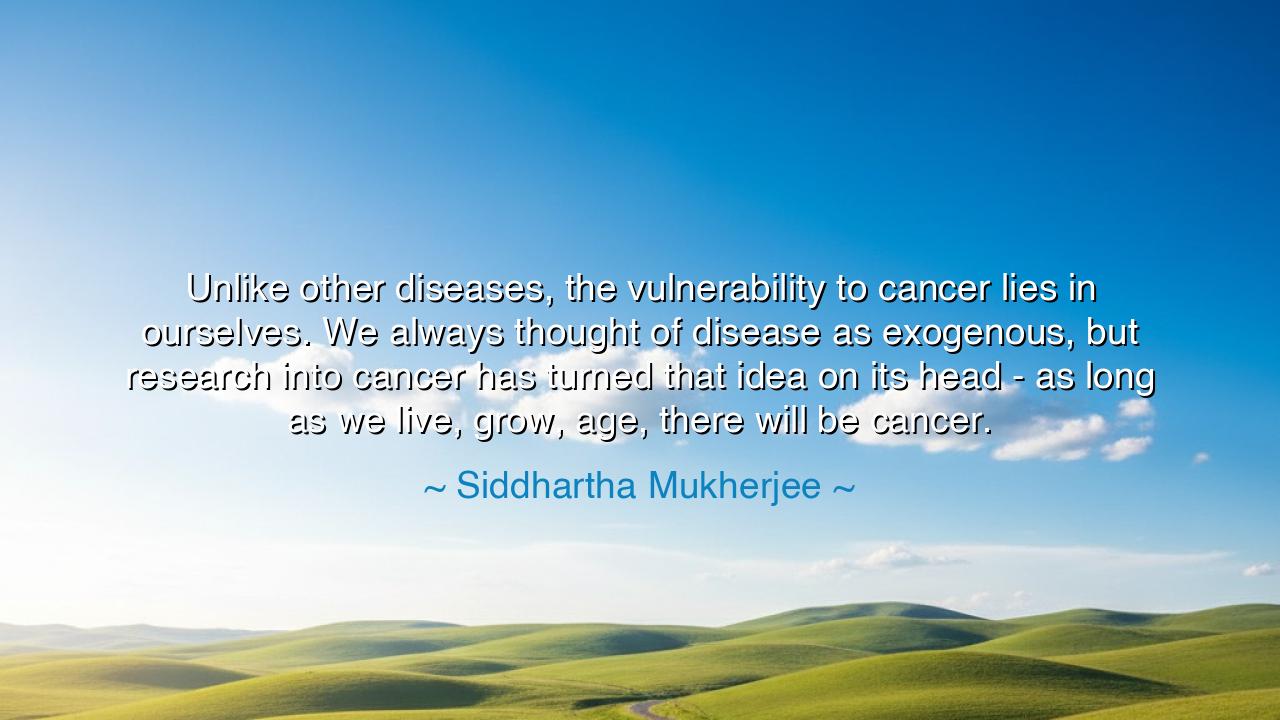
Unlike other diseases, the vulnerability to cancer lies in
Unlike other diseases, the vulnerability to cancer lies in ourselves. We always thought of disease as exogenous, but research into cancer has turned that idea on its head - as long as we live, grow, age, there will be cancer.






"Unlike other diseases, the vulnerability to cancer lies in ourselves. We always thought of disease as exogenous, but research into cancer has turned that idea on its head - as long as we live, grow, age, there will be cancer." – Siddhartha Mukherjee
In the grand sweep of human history, the battle against disease has always been one of humanity’s most ardent struggles. From the plagues of ancient Egypt to the pandemics that have swept through the ages, humanity has long viewed disease as an external force—something that strikes from the outside, beyond our control, something we must fend off or overcome. But Siddhartha Mukherjee, with profound insight, has revealed a deeply unsettling truth: unlike other afflictions, cancer does not merely arise from without, but rather from within. It is a part of us—a reflection of the very processes that define life itself.
For millennia, human beings viewed disease through the lens of external threats. The Ancient Greeks, whose wisdom has shaped much of our understanding of medicine, often saw illness as a result of divine displeasure or an imbalance in the body’s humors. Similarly, throughout history, epidemics were often understood as curses from gods or the result of unseen external forces. But what Mukherjee reveals in his words is a profound shift in perspective—that cancer, in its most fundamental form, is not just an alien invader, but a manifestation of our own biology gone astray. It is not something that happens to us; it is something that arises because of the very act of living, growing, and aging.
This understanding is both humbling and terrifying. In the ancient and medieval worlds, warriors and kings were often confronted by the might of the plague or the pestilence, diseases that seemed to strike indiscriminately, sparing neither high nor low. They fought against these forces, often seeing them as embodiments of nature’s wrath. Yet, cancer, as Mukherjee reminds us, is a disease that arises from the deepest core of our being—a malady born from our cells, a betrayal from within. Just as a great empire might fall from within, plagued by corruption and internal strife, so too does cancer arise when the very building blocks of life—our cells—begin to fail in their sacred duty.
But here lies the wisdom of Mukherjee’s revelation: this truth does not speak of despair, but of the complexity and beauty of life itself. Life, in its infinite mystery, is a dance between order and chaos. The very processes of growth and aging that sustain us also carry within them the seeds of destruction. It is as though we are walking a razor's edge, where every breath, every heartbeat, is both a gift and a gamble. In this light, cancer is not a curse, but a symptom of the profound mystery of existence. It is a reminder that life, in all its wonder, comes with an inherent risk—a risk that we must learn to live with, not fear, for it is as inevitable as the rising and setting of the sun.
The ancient philosophers knew that every life is finite—that mortality was the greatest truth we could know. Socrates spoke often of the mortal condition, understanding that death, though feared, was an essential part of what it means to be human. Today, we face the same reality, but with new knowledge—the vulnerability to cancer is not an external enemy but a part of the very essence of life. And like all battles, it is a struggle that every individual must face in their own way. Cancer reminds us that we are not separate from nature; we are part of it, bound by the same cycles of birth, growth, decay, and death that govern the world around us.
What can we learn from Mukherjee’s insight, and how can we apply it to our own lives? The lesson is one of acceptance—not resignation, but acceptance of our shared humanity and the impermanence of life. Cancer, in its cruel unpredictability, teaches us that life is fragile, and yet, it is through this fragility that we can find true meaning. Each day we live, each breath we take, is a gift. And while we may not have control over the forces that shape our biology, we do have control over how we choose to live with them. Do we fear them, or do we embrace life fully, with all its uncertainty and imperfection?
The practical action we must take is simple: live with intention, knowing that each day is a precious gift. Rather than fearing disease or the inevitability of suffering, let us celebrate life in all its beauty. Take care of the body that carries us through this journey, but also nourish the spirit, for it is in the pursuit of meaning—in love, in creation, in growth—that we find our true strength. Let us not be bound by the fear of what could come but live with the understanding that to live is to accept both the light and the shadow, the joy and the pain. In this way, we honor life in its full complexity, and with each breath, we embrace our own humanity.






AAdministratorAdministrator
Welcome, honored guests. Please leave a comment, we will respond soon